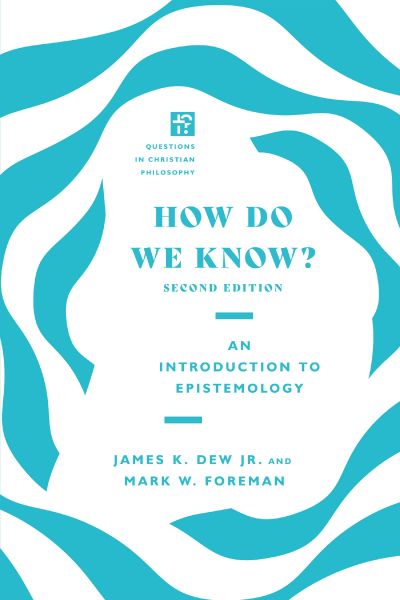How Do We Know?
An Introduction to Epistemology
What does it mean to know something? Can we have confidence in our knowledge?
Epistemology, the study of knowledge, can often seem like a daunting subject. And yet few topics are more basic to human life. We are inquisitive creatures by nature, and the unending quest for truth leads us to raise difficult questions about the quest itself. What are the conditions, sources, and limits of our knowledge? Do our beliefs need to be rationally justified? Can we have certainty?
In this primer on epistemology, James Dew and Mark Foreman guide readers through this discipline in philosophy. This second edition has been expanded with new material and now serves as the first volume in IVP's Questions in Christian Philosophy series. By asking basic questions and using clear, jargon-free language, they provide an entry into one of the most important issues in contemporary philosophy.
The Questions in Christian Philosophy Series features introductory textbooks that offer students a Christian perspective on the various branches of philosophy, enabling them as they seek to understand all facets of life including existence, knowledge, ethics, art, and more.
Mark W. Foreman (PhD, University of Virginia) is adjunct professor of philosophy and religion at Liberty University. He is also the author of Prelude to Philosophy: An Introduction for Christians and Christianity and Bioethics: Confronting Clinical Issues.
James K. Dew Jr. (PhD, Southeastern Baptist Theological Seminary; PhD, University of Birmingham) is president and professor of Christian philosophy at New Orleans Baptist Theological Seminary. He is the coauthor of Philosophy: A Christian Introduction and Understanding Postmodernism: A Christian Perspective and the coeditor of God and Evil: The Case for God in a World Filled with Pain and God and the Problem of Evil: Five Views.
Series Introduction: Questions in Christian Philosophy
Preface
1. What Is Epistemology?
2. What Is Knowledge?
3. Where Does Knowledge Come From?
4. What Is Truth, and How Do We Find It?
5. What Are Inferences, and How Do They Work?
6. What Do We Perceive?
7. Do We Need Justification?
8. Can We Be Objective in Our View of the World?
9. What Is Virtue Epistemology?
10. Do We Have Revelation?
11. How Certain Can We Be?
For Further Reading
Author Index
Subject Index
"This second edition of How Do We Know? is an exciting, timely provision for the body of Christ. Well-suited to serve as a textbook and a tool for the thoughtful lay reader, this volume is one of the clearest, most accessible introductions to epistemology I have ever read. The selection of topics covered is excellent and highly relevant for equipping believers to engage competently with the fundamental ideas that constitute our increasingly secularized culture. A delightful feature of the book is its regular and careful interaction with key figures in the history of philosophy. I joyfully recommend it."
"Dew and Foreman's How Do We Know? is a remarkably clear and concise discussion of central issues in epistemology. They explain difficult concepts as simply as possible without compromising accuracy, and they provide helpful illustrations throughout to ensure that readers will not get bogged down in the thicket of technical terminology. Epistemology is a field that can be as forbidding as it is important, and Dew and Foreman have done a wonderful service by giving us such an accessible treatment of the subject. Christian readers will find the book especially useful, as it includes discussions of faith, divine revelation, and other issues related to religious epistemology. Another virtue of the book is the authors' discussion of many major figures in the history of philosophy as well as significant contemporary epistemologists. I highly recommend this text to anyone interested in epistemology as well as students of theology and philosophy of religion."
"How Do We Know?, now in its second edition, will appeal to students and laypeople looking for an introduction to epistemology that includes the standard topics, theories, and arguments but avoids the complexity, technicality, and abstraction of other texts. In addition, Dew and Foreman provide their Christian readers with welcome resources for integrating the theory of knowledge with Christian theology. As a result, their survey of the field is more comprehensive than most. Among other attractive features of the volume are its frequent discussion of many classical and contemporary epistemologists, its helpful illustrations drawn from ordinary life, and its balanced treatment of controversial issues. This primer would serve well as a textbook for courses at Christian colleges, universities, and seminaries or as a guidebook for the general Christian reader interested in what philosophers have to say about knowledge as well as in the importance of epistemology for life, faith, and theology."
"Dew and Foreman provide a clear and intuitive introduction to the field of epistemology. This book will empower your mind. The authors skillfully help readers work through a well-organized series of questions about the foundations of knowledge building, and they draw out applications and implications of the different theories. A must-read for every Christian influencer and idea leader."
"The enormous success of movies like The Matrix and Inception shows that nonphilosophers can appreciate the importance of the central questions of epistemology. However, very few books on the topic succeed in addressing these questions on a beginner's level. The first edition of How Do We Know? was a welcome exception that has been very well received by our students, and this updated edition looks even better!" weniger anzeigen expand_less
Versandkostenfreie Lieferung! (eBook-Download)
Als Sofort-Download verfügbar
- Artikel-Nr.: SW9780830851898110164
- Artikelnummer SW9780830851898110164
-
Autor
James K. Dew Jr., Mark W. Foreman
- Wasserzeichen ja
- Verlag IVP Academic
- Seitenzahl 168
- Veröffentlichung 17.11.2020
- ISBN 9780830851898

